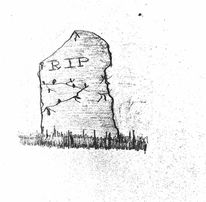
‘Whatever is Left’ is a short story written by the talented Cornish writer Kiera Smitheram. In 2019 it was the winning entry in that year’s Short Story competition, which is organised on a biennial basis by Cornish Story to promote our literary culture.
Moira had always been a chatty maid, but she found getting the conversation started tough. Usually she had an excuse to talk to someone; one of her brood, grown and gone now, would send a cricket ball through a window or into a flowerbed. She would escort them by the scruff of their collars to apologise. All would be forgiven, and she would be invited in for a cuppa whilst the offender was kicked back out into the street with the other children. Noisy buggers but good of heart, who always kissed her goodnight even when they brought her grandkids over for chip supper. None of that noise was here. For two months she had wandered, accompanied only by the onshore breezes and the occasional jogger. She had seen nobody like her.
He was sat on the bench with its back to Phillack Church, the shadow of the tower looming over him, heavy on his shoulders. Young looking, with a strong nose and an absent dreamer’s smile. She drifted closer, glad of the company. At first he didn’t notice her, and worried that he was a figment of her imagination. After a moment he came to and stared her straight in the face. It was hard to tell what colour his eyes were, but they were bright and welcoming.
“Hello. Nice to finally ‘ave bit of company,” he patted the space on the bench beside him. She gingerly took the space next to him. “I’m Charlie,”
“Moira. Pleased to meet e Charlie,” They sat for a moment, taking in the view of the other and trying to muster something to say. What do you ask a dead person when you’re dead yourself? “ow long ‘e bin ere fer?”
“1872, so wassat? ‘undred and sixty year odd,”
“Hell,”
“E can’t say that. Churchyard,” He pulled a solemn clergyman’s face – furrowed brow and God-fearing stare before a smile drew across him like a sunrise.
“Well. He dunnaw what ‘do with us, so I doubt ‘e give a toss what I say.” She glanced up at the silver sky, as if the Almighty was just waiting to answer her. When that didn’t work, she tapped the ground with her foot. No dull thud or dent in the overgrown grass followed. She noticed then that she wasn’t wearing the shoes she had been buried in. Instead of her reliable Hush Puppies she was wearing her beaten old tartan slippers. Why hadn’t she noticed that before? She tried to reach down and take it off, but her hand went straight through her own foot. She still wasn’t used to that, “Why ‘avent I been able to see ‘e?”
“Dunnaw. Its different fer everyone I’ve met. You’re probably wondering about the outfit,” he chuckled, “don’t ‘e worry. You come ‘ere in your most comfortable attire. Some people end up worse off than ‘e… dare I say less than ‘e.”
Charlie’s gaze wandered left, to the path that led out of the churchyard and over the rolling dunes, “Some view we got, though”.
“S’pose, yeah. Not same as bein’ down on ut. Feelin’ it ‘tween e toes. Seafoam an’ sand and the wind.” There was annoyance in her voice as she rested her chin on her hand, her toes circling the ground as if she were welling them into the soft, powdery gold.
“Poet then, are e?”
“I’m jus’ sayin’ it’s a bit crap t’only see it”.
“Better than some though. They pay good money t’only gawp at it fer a week er two”.
It was true and all. Poor deluded English folk would pile into their pristine four by fours and careen down the A30 for the summer holidays, hyped up on the promise of wall-to-wall sunshine. They were never ready for days like these; a steel sky, cutting wind, and stone-faced locals staring them down with generation-spanning contempt. Perhaps there were a few perks to purgatory.
Moira surveyed her new home when her eyes settled on some movement a few feet off. She gave a small chuckle.
“Some dog just shat on e”.
The pair stared as a well-manicured French poodle began to cover up its evidence on Charlie’s grave. No local would keep their dog that pristine, and if they did it would only be for the county show season. Dog shows were popular at the Recreation Ground in summer. Mainly they were a chance to laugh at some old Great Dane get stuck in a barrel, or a nervous Pekinese piss on a judge’s shoe. Soon enough they’d be down Mexico Towans with every scruffy mutt from St. Erth to Gwinear. This one’s owner had a shock coming.
“Bloody emmits! Don’t they knaw better thannat?”
“All bio-eco though these days. Won’t bag it so it can decompose”.
“Yes, but not where I’m decomposin’!”
Charlie stood and the dog stared at him, pulling at its leash to get a closer look. He got the reaction that he wanted; he had discovered wholly by accident that animals, particularly dogs, could still see him. The dog began to bark madly, but to its bewildered owner it seemed he was barking at the shadow of the church tower.
Moira smirked, “That coat won’t be stayin’ that white fer too long. Don’t they knaw that it’s mud and all sorts before they hit any beach?” She watched as the owner attempted to fight her way through the undergrowth surrounding the high, narrow step onto The Towans.
“Serve ‘em bleddy right. Ent no-one got manners anymore?”
Moira began to chuckle – even in death the Cornish stuck to their ways.
The two suddenly noticed a pair of new figures emerge from the thick billows of mist. These strangers knew the place, as they were able to navigate the crumbling, unsteady ground with a native’s ease. They were dressed for the terrain too, in hardy boots and high-necked fleece jumpers. They walked with a noted hesitance towards one of the newer stones at the top of the grounds, Moira’s stone. Suddenly she found herself stood before them, her hands resting on the gleaming granite. How she got there so quickly – another perk of her new position perhaps – she didn’t need to know at that moment. All she wanted was to gaze at the faces that were scorched into her heart, here again in flesh.
Charlie stood a little way off. He had seen similar scenes in his time, but not quite like this . She did not reach to place a cool breath of a hand on her loved ones’ shoulders or try and utter their names on the breeze. Moira just stared. If Charlie had breath left in his body, he would have been holding it.
Joe was always one for surprises. Nothing could have prepared Moira for this one coming. She realised now that the writing had been on the wall for years, yet it had never even crossed her mind. Joe was a popular child; outgoing, sporty, funny. Played rugby and cricket, swam in the sea as soon as Easter rolled around, and had a head for sums far beyond totting up change at the cash and carry. When the terrors of teenage misdemeanors reared their heads; Moira was braced for every kind of oddball to appear on her youngest child’s arm. To her relief, they never materialised. Love would find its way to Joe in time.
Kate was a frequent and welcome vistor. A sweet, bubbly girl that Joe had been friends with since their days at Truro College. A historian by nature who had played Principal Boy up Redruth Regal a few times. Joe was not a theatregoer, but always went when Kate performed.
“She looks better in them tights than I ever could!” Joe would laugh, nibbling on popcorn and whooping wildly every time Kate appeared.
This remark never alarmed Moira, until she came home one day earlier than planned to find Joe and Kate in a compromising position on the living room floor. She couldn’t remember who was more shocked, but she remembered picking Joe’s bra off the arm of the sofa and thrusting it towards her.
Joe left a week later.
“She always liked sunflowers, didn’t she” Kate broke the silence as she slipped her hand into Joe’s shaking one, noting the freshly cut bouquet beaming against the mist-shrouded stone.
“Yeah. Said that they reminded her of us lot. Turnin’ our ‘eads to the sun, like Cornish are meant to”.
Moira was stunned. She had forgotten how long it had been since she had actually seen her daughter. Nearly six years had passed, and yet every year without fail she had received a birthday card signed ‘with love from Joe and Kate’.
“What can I do, Charlie?” Moira could barely get the words out, “I can’t leave this as it was”.
“Nothing, you’re dead. I’m sorry, but ‘tis what ‘tis.”
So, was this her punishment? To suffer through the slowly, seeping years watching her child diligently visit this sad spot, in spite of the wound left? Had she still a working stomach, it would have sunk. Everything she had ever struggled through in life could not have prepared her for this moment. Pain in death – how many times had she been at a deathbed and heard the words,
“There will be no more suffering.”
Then again, those people weren’t left behind. She was left in limbo, discovering the horrors of the existence beyond first-hand.
Then she realised. This was not her suffering at all. It was Joe’s. She looked at her daughter and realised her death had lifted a weight from the couple. Now it was her burden to bear. She sat next to the flowers and ran her fingers along the petals. Even in the low mist the heads were straining towards the light. How apt. She wished she could run her fingers through Joe’s hair in the same way. It was too late for that now.
Joe and Kate rose and huddled together against the wind, giving the stone one last glance before fumbling back down the the slope towards the gates. It was starting to rain now, and the wind was picking up. This was no place for the living to linger. Moira stared after them, unable to tear herself from their forms in the mist.
Charlie put an arm around her shoulder as she rested her head in her hands. She couldn’t exactly feel the weight of it, but the sensation of a gentle, concerned presence was all she needed.
“It don’t get much easier, but you know she’s ‘appy and loved”.
“That’s what is keeping me ‘ere, isn’t it. When we’ve both moved on, I can go’.
Charlie said nothing. How long had he believed that he could change what he left behind? The guilt hurt most. Maybe Moira could change all that. He spoke.
“Don’t go just yet”

Illustrations by Kiera Smitheram

Kiera Smitheram is a singer, actor, musician, writer and totor originally from West Cornwall. She has performed nationally and internationally with many highly-acclaimed performances under her belt. Her essays and artickes have been enjoyed by members of the Cornish Diaspora the world over.
